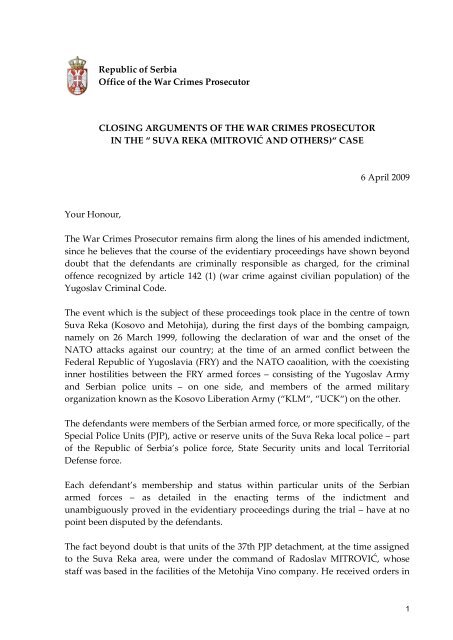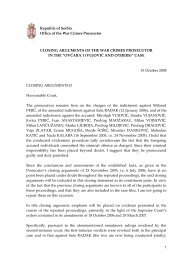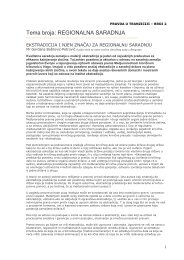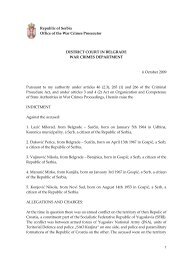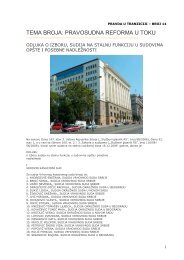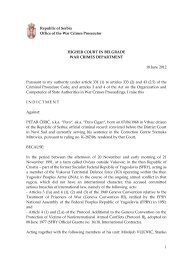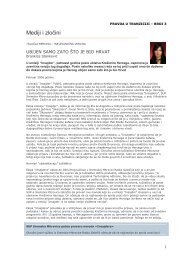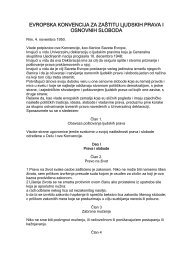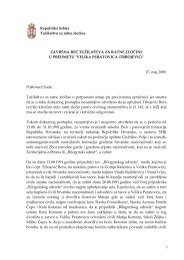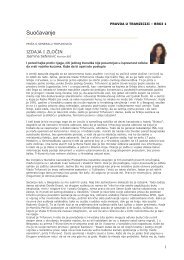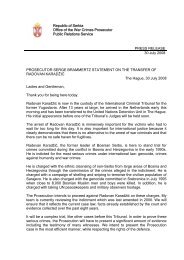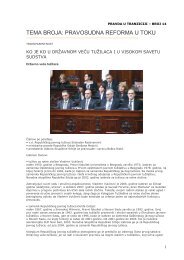SUVA REKA (MITR
SUVA REKA (MITR
SUVA REKA (MITR
You also want an ePaper? Increase the reach of your titles
YUMPU automatically turns print PDFs into web optimized ePapers that Google loves.
Republic of Serbia<br />
Office of the War Crimes Prosecutor<br />
CLOSING ARGUMENTS OF THE WAR CRIMES PROSECUTOR<br />
IN THE “ <strong>SUVA</strong> <strong>REKA</strong> (<strong>MITR</strong>OVIĆ AND OTHERS)“ CASE<br />
6 April 2009<br />
Your Honour,<br />
The War Crimes Prosecutor remains firm along the lines of his amended indictment,<br />
since he believes that the course of the evidentiary proceedings have shown beyond<br />
doubt that the defendants are criminally responsible as charged, for the criminal<br />
offence recognized by article 142 (1) (war crime against civilian population) of the<br />
Yugoslav Criminal Code.<br />
The event which is the subject of these proceedings took place in the centre of town<br />
Suva Reka (Kosovo and Metohija), during the first days of the bombing campaign,<br />
namely on 26 March 1999, following the declaration of war and the onset of the<br />
NATO attacks against our country; at the time of an armed conflict between the<br />
Federal Republic of Yugoslavia (FRY) and the NATO caoalition, with the coexisting<br />
inner hostilities between the FRY armed forces – consisting of the Yugoslav Army<br />
and Serbian police units – on one side, and members of the armed military<br />
organization known as the Kosovo Liberation Army (“KLM“, “UCK“) on the other.<br />
The defendants were members of the Serbian armed force, or more specifically, of the<br />
Special Police Units (PJP), active or reserve units of the Suva Reka local police – part<br />
of the Republic of Serbia’s police force, State Security units and local Territorial<br />
Defense force.<br />
Each defendant’s membership and status within particular units of the Serbian<br />
armed forces – as detailed in the enacting terms of the indictment and<br />
unambiguously proved in the evidentiary proceedings during the trial – have at no<br />
point been disputed by the defendants.<br />
The fact beyond doubt is that units of the 37th PJP detachment, at the time assigned<br />
to the Suva Reka area, were under the command of Radoslav <strong>MITR</strong>OVIĆ, whose<br />
staff was based in the facilities of the Metohija Vino company. He received orders in<br />
1
the Priština-based headquarters, whose members, among others, were General<br />
LUKIĆ, Obrad STEVANOVIĆ and Vlastimir ĐORĐEVIĆ.<br />
Furthermore, the official report issued by the Republic of Serbia’s Ministry of the<br />
Interior – Minister’s immediate office, registered under number 017828/058 and<br />
dated 7 July 1999, confirms that the 37th PJP Joint Detachment and 5th Company –<br />
part of the 124th PJP Intervention Brigade - were at the time assigned to the Suva<br />
Reka area, under the overall command of Colonel Radoslav <strong>MITR</strong>OVIĆ.<br />
The results of the evidentiary proceedings, the statement provided by defendant<br />
Radoslav <strong>MITR</strong>OVIĆ and matching that of witness Božidar DELIĆ, as well as a<br />
number of statements given by other army or police members, give grounds to the<br />
following conclusions:<br />
- In the period between 20 and 26 March, i.e. immediately prior to the onset of the<br />
bombing campaign and in the first days thereof, the UCK launched intensive attacks<br />
against army and police units across the Suva Reka area. Specifically, the UCK forces<br />
operating in the region included the 124th, 122nd and 121st Brigades and formations<br />
of local command staffs, which made a total of between 1,500 and 3,000 UCK troops.<br />
- On 20 or 21 March, accompanied by Božidar DELIĆ, the defendant went to Priština<br />
in order to receive documents for the tasks due to be carried out in case the bombing<br />
started. The tasks involved the neutralization of the UCK units deployed inside the<br />
triangle Prizren – Suva Reka – Orahovac and the establishment of communication.<br />
Having received instructions from Priština, <strong>MITR</strong>OVIĆ and DELIĆ immediately<br />
elaborated details of their further activities, and started the realization of their tasks<br />
in the ealy morning of 25 March, by launching an attack on the UCK force in the<br />
Suva Reka area. The attack was carried out by the unit under <strong>MITR</strong>OVIĆ’s<br />
command, with the support of the 549th and 243rd motorized brigades of the<br />
Yugoslav Army.<br />
- In the above described circumstances, Radoslav <strong>MITR</strong>OVIĆ had a dual role as the<br />
commander of the joint PJP detachment and leader of the ongoing offensive<br />
operation, i.e. part of the operation conducted by the joint military and police forces.<br />
The logical conclusion arising from the foregoing facts is that in his capacity as<br />
specified above, Radoslav <strong>MITR</strong>OVIĆ certainly had contacts with the chief of the<br />
local police and with its commander, i.e. asked them for logistic and other support,<br />
as well as for the local police reinforcements in order to carry out the said operation.<br />
The foregoing conclusion is substantiated by the fact that the primary goal of the<br />
operation under his command was to create favourable conditions and<br />
communications with a view to cleansing the area of the UCK presence and placing it<br />
2
under the control of the local law enforcement authorities, i.e. the Suva Reka police.<br />
In terms of military technics and tactics, i.e. according to the rules of military<br />
doctrine, the nature of the operation was such that the forces of the local police,<br />
Territorial Defence and Civil Protection in Suva Reka were part of the joint combat<br />
force within the 37th PJP Detachment. This further means that, by virtue of being an<br />
overall commander of the task, Radoslav <strong>MITR</strong>OVIĆ was also entitled command<br />
over the local police (who were supposed to take control upon the seizure of the<br />
territories), as well as over the Territorial Defence and Civil Protection forces.<br />
Beside such rights and authorities, Radoslav <strong>MITR</strong>OVIĆ, being the commander of<br />
the 37th PJP Detachment and head of the military operation at issue, bears major<br />
moral and any other responsibility. His responsibility, which arises from the<br />
principles of military doctrine and armed combat, and from the rules of military<br />
leadership and command at times of war and peace, covered all developments and<br />
activities of the unit under his command.<br />
The foregoing conclusion is further substantiated by a number of witnesses – former<br />
members of the Suva Reka police force. They all view <strong>MITR</strong>OVIĆ’s role as that of<br />
commander, since they personally observed his relationship with heads of the local<br />
police, who readily carried out orders received from him.<br />
In addition to the above, the Defence Ministry report (ref. VBA – SP 3186-2) of 21<br />
March 2006 specifies that, in the early morning of 25 March 1999, combat group 5<br />
(BG-5) – part of the 549th Motorized Brigade, passed through Suva Reka and<br />
proceeded towards villages Reštane, Studeničane and Samodraža, where they<br />
remained conducting their operations until 27 March 1999. On the said date they<br />
moved off in the direction of Samodraža, Dobrodeljane and Paraguša, where they<br />
continued their operations until 1 April 1999. The report also specifies that in the<br />
aforementioned period the Yugoslav Army did not engage in any military operations<br />
in the Suva Reka area, because the town was controlled by the Republic’s Ministry of<br />
the Interior (MUP). The report thus makes it clear that the VJ forces bear no<br />
responsibility whatsoever for the events that took place in Suva Reka in the period<br />
specified. Likewise, it is clear from the report that no UCK units or individual<br />
members were present inside the town at the time.<br />
The fact beyond doubt is that regular forces of the Suva Reka local police were also<br />
present in the area. Specifically, active members of the police force launched<br />
crackdowns on the UCK, whereas reserve forces were assigned to regular law<br />
enforcement duties, which mostly involved protection of police facilities, operations<br />
of constable services and patrol teams, and other tasks as necessary.<br />
Those units were under the de iure and de facto control of the accused, Radojko<br />
3
REPANOVIĆ, who was the police comander, and his deputy Nenad JOVANOVIĆ<br />
(the latter’s competences included the command over the reserve force). The accused,<br />
Slađan ČUKARIĆ and Miroslav PETKOVIĆ, were members of the Suva Reka local<br />
police; the accused, Milorad NIŠAVIĆ, was the State Security officer in charge of the<br />
Prizren area, whereas the accused, Zoran PETKOVIĆ, was member of the Suva Reka<br />
Territorial Defence force.<br />
On 26 March 1999, from 12:00 hrs onwards, all of the herein accused individuals<br />
engaged in the acts as detailed in the enacting terms of the indictment, including<br />
attacks on civilian persons and buildings in the part of Suva Reka called Reštanski<br />
Put. In the aftermath of the said attacks, fifty civilians – mostly women and children<br />
from the BERISHA family – were killed, almost all houses in the attacked part of the<br />
town were set on fire and burnt down, whereas the local population was robbed of<br />
their possessions. The overall campaign resulted in a mass exodus of local Albanians<br />
from the town.<br />
Numerous witnesses heard throughout the evidentiary proceedings – including<br />
ethnic Albanian civilians, witness A, witness VELJKOVIĆ and others – have<br />
unambiguously confirmed the following facts:<br />
- On 26 March 1999 at around 12:00 hrs, two trucks loaded with members of the 37th<br />
PJP Detachment, and a landrover carrying the accused, <strong>MITR</strong>OVIĆ, arrived in front<br />
of the local police station in Suva Reka. Having got off the trucks, the attackers split<br />
into smaller groups headed towards the road called Reštanski Put. As they moved<br />
along the road, they forcibly entered the BERISHA family houses on the left and<br />
right, which they searched and set on fire.<br />
- Concurrently standing outside the police station building were several active and<br />
reserve members of the Suva Reka police force, as well as Milorad NIŠAVIĆ, who<br />
was a member of the then Republic’s State Security.<br />
- In front of the police station building, the accused, <strong>MITR</strong>OVIĆ, ordered<br />
REPANOVIĆ’s deputy Nenad JOVANOVIĆ that the group of the Suva Reka police<br />
members – whom REPANOVIĆ had previously assigned to the task and placed<br />
under JOVANOVIĆ’s control – join the operation, saying: “Come on, what are you<br />
waiting for... or you perhaps expect me to do that instead of you!“<br />
- Slađan ČUKARIĆ took a detainee named Abdulah ESHLANI out of the Suva Reka<br />
police station building, whereupon he deprived the victim of life with a gunshot<br />
from his automatic rifle.<br />
- The accused, JOVANOVIĆ, passed <strong>MITR</strong>OVIČ’s order to the said police unit,<br />
instructing them to join the still unidentified members of the 37th PJP Detachment,<br />
4
who had already started the terrain cleansing operation by attacking homes at the<br />
site called Reštanski Put. In subsequence, JOVANOVIĆ personally took part in the<br />
operation by joining the unit which was composed of active and reserve police<br />
members, including the accused: Slađan ČUKARIĆ, Miroslav PETKOVIĆ, Milorad<br />
NIŠAVIĆ and Zoran PETKOVIĆ, along with Radovan TANOVIĆ (now deceased),<br />
witness “A“, and several other – still unidentified – local police and Territorial<br />
Defence members.<br />
- Thus, Slađan ČUKARIĆ and Miroslav PETKOVIĆ – in a joint and synchronised<br />
campaign with a number of other individuals, including the now deceased local<br />
police member Radovan TANOVIĆ, State Security officer Milorad NIŠAVIĆ,<br />
Territorial Defence member Zoran PETKOVIĆ, as well as a number of other<br />
unidentified members of the local police, Territorial defence, State Security and 37th<br />
PJP Detachment – consciously and wilfully engaged in the execution of the received<br />
order.<br />
Armed with their personal weapons, they left the local police station courtyard and<br />
headed towards Reštanski Put, in order to raid the homes of Albanians who were not<br />
participating in the hostilities. They removed the innocent civilians from their homes,<br />
which they subsequently searched, plundered and burnt; as they did so, they killed<br />
some of the occupants on the spot, and held others at gunpoint while directing them<br />
towards and inside the local trading centre, where, after a certain while, almost all of<br />
them were killed.<br />
In his dual capacity as commander of the 37th PJP Detachment and of the operation<br />
charged, the accused, <strong>MITR</strong>OVIĆ, bears major command, moral and any other<br />
responsibility for developments in the zone of responsibility controlled by his unit.<br />
Likewise, apart from the crime which involved the attacks on, and the killing of the<br />
civilians as described, he bears full responsibility for all other crimes that occurred in<br />
his zone of responsibility.<br />
In addition to the above, <strong>MITR</strong>OVIĆ is responsible for the acts of his subordinates –<br />
members of the unit under his control – who searched and burnt the local Albanians’<br />
family homes in Suva Reka. Specifically, according to the testimonies offered by a<br />
number of eyewitnesses, they burnt two or three houses opposite the police station<br />
building, several houses situated along the earth section of the road called Reštanski<br />
Put, as well as several others on its main section – namely the houses owned by<br />
Faton, Nexhad and Vesell BERISHA; furthermore, they set on fire and destroyed the<br />
local trading centre and pizza restaurant, as detailed by the accused: Miroslav<br />
PETKOVIĆ and Nenad JOVANOVIĆ, by witnesses “A“, Shirete BERISHA, Violca<br />
BERISHA, Ljubiša GOGIĆ, Velibor VELJKOVIĆ, and almost all other witnesses who<br />
were present at the crime scene and personally saw the remains of the burnt-down<br />
structures.<br />
5
The accused, <strong>MITR</strong>OVIĆ, is additionally responsible for failing to prevent his<br />
subordinates from plundering a spare car parts store situated in the immediate<br />
vicinity of the BERISHA family home, whose members were forced outside their<br />
home and taken to the pizza restaurant, where they were held confined. While some<br />
members of his unit engaged in the killing of the captives locked inside the<br />
restaurant, others were busy loading a PJP truck with goods plundered from the<br />
spare car parts store until it remained completely empty, whereupon the loot was<br />
driven away... The foregoing facts have been confirmed by witnesses Agron<br />
BERISHA and “A“, as well as by the accused, Miroslav PETKOVIĆ.<br />
The accused, <strong>MITR</strong>OVIĆ, is also responsible for failing to punish the perpetrators of<br />
the above described crimes. Likewise, he failed to make a report on the event at issue<br />
and notify the Kosovo Police Headquarters thereof.<br />
The accused, <strong>MITR</strong>OVIĆ, claims in his submission that he did not order attacks on<br />
civilians and that he was unaware of the fact that the attack had been launched.<br />
<strong>MITR</strong>OVIĆ further claims that on 26 March 1999 he was not at all present at the<br />
scene, and goes on to explain that on the said day he was in Prizren, visiting a<br />
wounded member of his detachment and arranging his transport by helicopter to the<br />
Military Medical Academy (VMA) in Belgrade. Finally, he specifies that he remained<br />
in Prizren until about 13:00 hrs, when the helicopter with the wounded took off and<br />
departed for Belgrade.<br />
However, the VMA document – record on patients admissions shows that the<br />
wounded who were transported by helicopter to Belgrade on that day were admitted<br />
for treament at 10:00 a.m. In view of the fact that a helicopter flight from Prizren<br />
takes a minimum of two hours, the only logical conclusion is that the wounded must<br />
have been cared for by 8:00 a.m. at the latest. Moreover, a number of witnesses who<br />
have testified throughout these proceedings, as well as the accused, Nenad<br />
JOVANOVIĆ, indicate that <strong>MITR</strong>OVIĆ was actually present in Suva Reka on the<br />
critical day. On the other hand, the witnesses proposed by <strong>MITR</strong>OVIĆ himself have<br />
failed to confirm the accused’s alleged alibi.<br />
Referring to the presence of the accused, Radoslav <strong>MITR</strong>OVIĆ, in Suva Reka on 26<br />
March, both witness “A“ and the accused Nenad JOVANOVIĆ have confirmed that<br />
they did see him there around noon, first standing in the police building courtyard,<br />
and then entering the building in order to see the commander. According to the same<br />
testimonies, members of the 37th PJP Detachment were also present there. Having<br />
got off the two trucks which had carried them to the scene, they split into smaller<br />
groups, started searching houses in the area of Reštanski Put and burning them in<br />
the process. Moreover, they killed anyone whom they would find either inside or on<br />
the road. Meanwhile, several other members of the unit engaged in the plundering of<br />
the local spare car parts store, whose owner was Vesel BERISHA. Having loaded the<br />
6
looted goods onto a truck which they had parked in front of the store shortly ahead<br />
of that “action“, they got onto the truck and drove away. According to the statement<br />
given by witness SIKETIĆ, who, at the time of the attack on Suva Reka, was the<br />
commander of the 3rd Company within the 37th PJP Detachment, this witness was<br />
present at the plenary top-level meeting when the 37th PJP Detachment was assigned<br />
to carry out a cleansing operation in the area between Reštane and Orahovac. On that<br />
occasion this witness learnt that the overall operation would be headed by<br />
Detachment commander <strong>MITR</strong>OVIĆ, who personally ordered him to engage the<br />
company under his command in the cleansing of the section between the central part<br />
of Reštane and Slapužane.<br />
Further on in his statement, this witness describes how members of his unit reached<br />
the police station building in Suva Reka, where they split into smaller groups and<br />
proceeded on foot, raiding houses on their way. The above description suggests that<br />
this witness statement actually refers to the event of 26 March 1999, which again<br />
leads us to the conclusion that it was the accused, <strong>MITR</strong>OVIĆ, who issued orders for<br />
participation in the attack.<br />
However, <strong>MITR</strong>OVIĆ did not only issue the attack orders before the onset of the<br />
operation, but was also in full command of the developments when the attack<br />
actually started. Specifically, witness ”A” and accused JOVANOVIĆ testify that<br />
<strong>MITR</strong>OVIĆ arrived by car in front of the Suva Reka police station building at the<br />
same time as members of the 3rd Company – part of the 37th PJP Detachment, who<br />
came to the site on trucks. They immediately split into smaller groups and started<br />
carrying out raids, whereupon <strong>MITR</strong>OVIĆ ordered JOVANOVIĆ that members of<br />
the Suva Reka local police should also join the operation. As the operation gained<br />
momentum, <strong>MITR</strong>OVIĆ maintained a radio-link communication with witness<br />
SIKETIĆ, giving him instructions on what his people should do next, and receiving<br />
feedback about developments in the field. Namely, among other details mentioned in<br />
his description of the operation, witness SIKETIĆ says that <strong>MITR</strong>OVIĆ was all the<br />
while close to the site of the operation and updated on its course and progress.<br />
Likewise, in his description of the same operation, witness Goran SPASIĆ, who was<br />
the commander of the 1st Platoon in SIKETIĆ’s company, confirms the fact that he<br />
received <strong>MITR</strong>OVIĆ’s orders through SIKETIĆ, since the two were on a radio link<br />
throughout the whole course of the operation.<br />
Witnesses SIKETIĆ and SPASIĆ understandably deny the fact that the accused,<br />
<strong>MITR</strong>OVIĆ, ordered the burning of houses and killing of civilians. Additionally,<br />
these two witnesses claim that the action did not involve the burning of houses or<br />
killing, and that members of the 37th PJP Detachment searched empty houses;<br />
however, this part of their testimony is false, which – apart from their wish to help<br />
<strong>MITR</strong>OVIĆ, who was their wartime commander – reflects their concerns that they<br />
might also be held criminally responsible for involvement in this war crime.<br />
7
Witnesses Goran OBRADOVIĆ and Ljubiša STOJANOVIĆ – at the time <strong>MITR</strong>OVIĆ’s<br />
personal escort and driver respectively – have also confirmed the fact that this<br />
accused was in Suva Reka on 26 March 1999. Specifically, witness OBRADOVIĆ<br />
claims that he accompanied <strong>MITR</strong>OVIĆ to the Suva Reka police station at around<br />
14:00 hrs, whereas witness STOJANOVIĆ testifies that he drove the accused to the<br />
Metohija Vino company building in Suva Reka between 15:00 and 16:00, which<br />
means that those events occurred several hours after the attack against civilian<br />
targets in Suva Reka. In an obvious effort to protect the accused, with whom they<br />
were close wartime associates, witnesses OBRADOVIĆ and STOJANOVIĆ have<br />
failed to specify the exact time of their arrival in Suva Reka, and provided false (and<br />
mutually mismatched) testimonies.<br />
Witness “A“testifies that, at the moment when the attack operation on civilians in<br />
Suva Reka was taken over by the 3rd Company of the 37th PJP Detachment,<br />
<strong>MITR</strong>OVIĆ ordered JOVANOVIĆ and a group of local police officers present in front<br />
of the Suva Reka police station building to join the attack, saying: “Come on, what<br />
are you waiting for, do you expect me to do that instead of you!“. The accused,<br />
JOVANOVIĆ, acted upon that order by instructing the group to start the action. The<br />
above described conduct of both accused, <strong>MITR</strong>OVIĆ and JOVANOVIĆ, as well as<br />
that of the said local police members, suggests that the group’s participation in the<br />
attacks under <strong>MITR</strong>OVIĆ’s overall command was part of a previously prepared<br />
plan.<br />
The fact that <strong>MITR</strong>OVIĆ, in his capacity as the operation commander, had a decisive<br />
role in ordering attacks against civilians in Suva Reka is corroborated by the<br />
statement provided by witness “A“ during the investigation (Investigation Record,<br />
pp. 120 and 129), where he says: “If Čegar 1 (<strong>MITR</strong>OVIĆ’s alias) – that is, the man<br />
who came – if he had not made his assistant (i.e. JOVANOVIĆ) order us to join the<br />
attack, there would have been no need for us to enter those houses... I mean, if he<br />
had not ordered it, we would have never done it. After all, it was not our job to do<br />
it.“ Further in the Investigation Record, asked: “Do you want to say that, had it not<br />
been for him coming to the scene, there would have never been a massacre in the<br />
Trade Centre“, witness “A“ replies: “Exactly, there would have been no massacre<br />
whatsoever. There would have been no need for us to join them, for none of us,<br />
including aka Jajce, PETKOVIĆ and everyone else.“<br />
According to the statements provided by numerous witnesses and some of the<br />
accused, <strong>MITR</strong>OVIĆ had visited the local police station in Suva Reka on several<br />
occasions before the attack, and particularly in the period shortly preceding the<br />
operation. During those visits, he had regularly spoken to REPANOVIĆ – the local<br />
police commander at the time – and other leading officials of the local police, and<br />
held meetings with them. Witness VELJKOVIĆ testifies that, even before<br />
REPANOVIĆ actually joined the operation, a group of his people – members of the<br />
8
Suva Reka local police – had been designated to participate in the attacks and killings<br />
of civilians. Likewise, another group had been assigned to load the killed civilians’<br />
bodies onto a truck immediately after the attack. In the light of the foregoing, it can<br />
be concluded that <strong>MITR</strong>OVIĆ – being in command of the overall operation – was the<br />
only person who could order REPANOVIĆ to have his people engaged in the<br />
operation, and that he had done so even before the attacks actually started.<br />
REPANOVIĆ immediately responded to the order received from <strong>MITR</strong>OVIĆ, by<br />
picking up people to form two groups – one that would participate in the attack, and<br />
another that would load the bodies once the operation was over.<br />
According to the testimonies provided by a number of local inhabitants who<br />
survived the attack, as well as by other witnesses, it can be unambiguously<br />
concluded that at the time of the attack against civilians in Suva Reka, there were no<br />
UCK units or individuals present in the area, the fact which must have been known<br />
to <strong>MITR</strong>OVIĆ and all other participants in the attack, including the herein accused<br />
individuals. Consequently, the aim of the attack was not to search the area, find any<br />
hidden weapons and eliminate the UCK presence. Instead, as witness SIKETIĆ puts<br />
it, the aim of the attack was to “cleanse the area“, not of the UCK, but rather of the<br />
local Albanian population, by way of burning their homes and killing some of those<br />
civilians. The reliability of such conclusion is additionally corroborated by witness<br />
Velibor VELJKOVIĆ, who claims that in the course of the attack a new order came –<br />
from the Ministry of the Interior local office, as the witness presumes – that people<br />
should no longer be killed, but instructed to leave their homes within half an hour,<br />
take their possessions and head towards Albania. The order, according to this<br />
witness, was duly obeyed.<br />
In the light of the above facts, <strong>MITR</strong>OVIĆ’s defense allegations are false and<br />
ungrounded. Namely, the operation under his command was conducted exactly<br />
according to a previously designed plan, and he was present at the scene when<br />
members of the 3rd Company – part of the 37th PJP Detachment – split into smaller<br />
groups that started burning civilian homes and killing innocent people. As the raid<br />
gained momentum, <strong>MITR</strong>OVIĆ at no point showed that such developments were in<br />
contrast with his orders. Moreover, he ordered that the Suva Reka police force also<br />
join the operation, whereupon he watched the operation from a close distance, sitting<br />
in his car. Additionally provided with a radio link that kept him continuously<br />
informed about the course of the operation, <strong>MITR</strong>OVIĆ at no point intervened to<br />
indicate that members of the 37th PJP Detachment and the local police were not<br />
acting in line with the orders received from him.<br />
All of the above circumstances indicate that the overall operation was aimed at the<br />
intimidation of Albanian civilians, and that it was <strong>MITR</strong>OVIĆ who at one point<br />
ordered the attackers to stop the killings and force the surviving civilians whom they<br />
would find in their homes to leave Suva Reka and go to Albania. Namely, save for<br />
9
<strong>MITR</strong>OVIĆ, no other member of the State police force present in the Suva Reka area<br />
at the time of the attack had the authority to issue such orders.<br />
The accused: Radojko REPANOVIĆ, Milorad NIŠAVIĆ and Zoran PETKOVIĆ deny<br />
committing the criminal offence as detailed in the enacting terms of the indictment,<br />
and claim that at the time of the event they were not present in Suva Reka.<br />
Specifically, REPANOVIĆ claims that at the time of the event he was visiting police<br />
checkpoints and positions of his unit outside Suva Reka; Zoran PETKOVIĆ and<br />
Milorad NIŠAVIĆ maintain that they were in Prizren on that day; as for Slađan<br />
ČUKARIĆ, he initially claimed that he had not used weapons on that day or killed<br />
anyone; he also said that he could not remember where he had spent the day,<br />
whereas he had learnt about the crime from the media. In subsequence, however,<br />
ČUKARIĆ changes his defence and describes what happened in Suva Reka on the<br />
critical day; as he does so, he minimises his role and emphasizes that of NIŠAVIĆ.<br />
Nenad JOVANOVIĆ maintains that he had never been ordered, either by <strong>MITR</strong>OVIĆ<br />
or REPANOVIĆ, to carry out attacks on civilians in Suva Reka. Ultimately, Miroslav<br />
PETKOVIĆ – the only one who admits being present at the scene when the killings<br />
were committed – denies his involvement in the crimes and pinpoints the deceased<br />
Radovan TANOVIĆ as the perpetrator.<br />
However, all of the above defence allegations are in contradiction with a mass of<br />
evidence presented and therefore inadmissible. The witnesses whom some of the<br />
accused proposed in order to provide support to their alleged alibis have not been<br />
able to confirm their defence allegations and consequently failed to add credibility<br />
thereto. Additionally, some of the accused’s defence cases are in flat contradiction<br />
with the written evidence contained in the case files.<br />
Witnesses “A“ and Veroljub VELJKOVIĆ confirm in their statements that<br />
REPANOVIĆ and JOVANOVIĆ were present at the scene, that they received orders<br />
from <strong>MITR</strong>OVIĆ and acted thereupon by ordering members of the unit under their<br />
immediate command to launch attacks against civilians.<br />
Witnesses Bogoljub TRAJKOVIĆ, Svetozar NEDELJKOVIĆ, Jovica TRAJKOVIĆ, “B“<br />
and “C“ confirm in their statements that REPANOVIĆ and <strong>MITR</strong>OVIĆ were present<br />
in front of the pizza restaurant at the time when the victims’ death remains were<br />
loaded on a truck and driven away.<br />
“Radojko told me that the corpses should be loaded and carried away, but since I<br />
was not feeling well, he told me to go home“, witness Jovica TRAJKOVIĆ claims.<br />
The fact that JOVANOVIĆ did pass <strong>MITR</strong>OVIĆ’s order to his people is confirmed by<br />
witness “A“, who claims that the former accused told a group of policemen to follow<br />
the PJP members, and personally joined them on their way towards Reštanski Put.<br />
10
On the other hand, witness Bogoljub TRAJKOVIĆ testifies that JOVANOVIĆ was<br />
certainly present during the loading of the death remains, which leads us to conclude<br />
that JOVANOVIĆ must have been aware of the nature of the operation at issue.<br />
Hence, his attempt to defend himself by claiming that he sent his people to Reštanski<br />
Put in order to carry out a site assessment cannot be accepted.<br />
As for the accused, Zoran PETKOVIĆ, his presence at the scene of the crime and<br />
personal involvement therein are described in detail by witnesses Shirete BERISHA<br />
and Vjollca BERISHA. The survivors of the massacre, the two have identified this<br />
accused as the person who, along with a group of policemen, took part in the attack<br />
on their home and in the killing of their family members and close relatives, both in<br />
front of the house and inside the pizza restaurant. Zoran PETKOVIĆ has also been<br />
identified by Marjan KRASNIQI, as the one who drove away the truck loaded with<br />
the civilians’ death remains in the direction of Prizren.<br />
The involvement of the accused, Milorad NIŠEVIĆ, is explained in detail by witness<br />
Shirete BERISHA, as well as another accused, Slađan ČUKARIĆ.<br />
The fact that the accused, Miodrag PETKOVIĆ and Slađan ČUKARIĆ, had an active<br />
role in the crime is corroborated by the statements of numerous witnesses who were<br />
present at the site, including local people, members of the Serbian police and several<br />
workers of Roma nationality engaged on the removal of the bodies from the pizza<br />
restaurant and their loading on the truck. All of the foregoing witnesses confirm that<br />
the two were personally involved in the killings, both in the victims’ homes and, in<br />
particular, inside the pizza restaurant; specifically, the accused discharged bursts of<br />
fire and launched missiles from their automatic rifles; in subsequence, they threw<br />
three hand grenades on the innocents who had been herded into the pizza<br />
restaurant; eventually, they killed the survivors in the presence of at least 15<br />
witnesses – policemen and workers engaged on the loading of the victims’ death<br />
remains, all of whom have provided clear and mutually coinciding statements before<br />
the court, regarding the involvement of these two accused individuals in the<br />
liquidations.<br />
In view of the foregoing, the prosecution deems that the defence cases presented by<br />
all of the herein accused should be dismissed as ungrounded and aimed at the<br />
evasion of criminal responsibility for the crimes committed.<br />
The objective circumstances established throughout these proceedings, alongside the<br />
facts and circumstances presented by witnesses proposed and heard, highlight each<br />
accused’s particular role in the crime, thus pointing to the conclusion that all of the<br />
herein accused individuals are criminally responsible for the acts detailed in this<br />
indictment.<br />
11
Specifically, the accused: Radoslav <strong>MITR</strong>OVIĆ, Radojko REPANOVIĆ and Nenad<br />
JOVANOVIĆ committed the criminal offence by ordering the attacks, whereas the<br />
the criminal responsibility of the accused: Slađan ČUKARIĆ, Miroslav PETKOVIĆ,<br />
Milorad NIŠAVIĆ and Zoran PETKOVIĆ is reflected in the fact that they consciously<br />
and wilfully acted upon the received orders by carriying out the criminal offence as<br />
charged. The individual roles of the accused included direct killing, roundups of the<br />
victims’ homes, opening gunfire on civilians – mostly women and children – who<br />
were thereby forced to move towards the pizza restaurant, where the victims<br />
eventually got killed in a most brutal manner. By their individual involvement in the<br />
said acts, each of the accused directly participated in, and personally contributed to<br />
the commission of the crime charged.<br />
In view of the continuing hostilities which existed between the FRY armed forces and<br />
the Kosovo Liberation Army, and which, by the time of the criminal event at issue,<br />
had not been resolved by a mutual peace agreement or a peaceful settlement of the<br />
conflict, in this particular case it would be appropriate to apply international criminal<br />
law, whereby a party to the conflict – members of the Serbian armed force and their<br />
command structure – were at all times obligated to respect the provisions of the<br />
Geneva Conventions and Additional Protocols thereto.<br />
Hence, the crimes, acts and omissions charged by this indictment were committed on<br />
the part of the accused – members of Serbia’s police, territorial defence and state<br />
security forces – within the framework of the said armed conflict.<br />
All of the victims of the crimes described here were civilians, and the fact that they<br />
were ethnic Albanians was the reason of their deaths. This fact also points to the<br />
conclusion that the victims of the crimes charged by this indictment were deprived of<br />
life and had their homes burnt for no other reason save for their ethnic backgrounds.<br />
In such circumstances, and to the extent to which they were not otherwise protected<br />
by the Geneva Conventions, the victims were at all relevant times supposed to enjoy<br />
the status of “protected persons“ under the Fourth Geneva Convention. However,<br />
members of the police evidently viewed the victims as persons belonging to the<br />
opposing party to the conflict, who, as such, posed a potential threat.<br />
In consideration of the above, all of the injured persons specified in the enacting<br />
terms hereof, being civilians and ethnic Albanians, had the status of protected<br />
persons under article 3 (para.1 – items 1a, 1d) of the Fourth Geneva Convention of 12<br />
August 1949 (protection of civilian persons in wartime); under articles 51, 75, 76 and<br />
77 of Additional Protocol I (protection of victims of international armed conflicts);<br />
and under articles 4 and 13 of Additional Protocol II (protection of victims of<br />
noninternational armed conflicts).<br />
In the light of all that has been said above, the prosecution holds that by their acts<br />
12
and omissions, all of the individuals accused here committed the criminal offence<br />
recognized by article 142 (1) (war crime against civilian population) of the Yugoslav<br />
Criminal Act.<br />
These days a street in Novi Sad has been named after a young man from Trebinje<br />
who during the war protected a fellow citizen of different nationality, an act of<br />
bravery that cost him life.<br />
On 26 March 1999 in Suva Reka, such acts of bravery were not seen. Instead, cries for<br />
help were hushed by bullets. Servants of the state mercilessly killed the helpless<br />
citizens of that same state. The murderers viewed the innocents whom they killed as<br />
not being “part of us“, which they believed gave them the right to kill. Who could<br />
ever fathom the pain of anticipating imminent death<br />
Shirete BERISHA, a witness who survived the massacre, talked about her experience<br />
in this very courtroom on 4 December 2007: “... A group of Serbs came and forced us<br />
to enter the café. As soon as we entered, they ordered us to sit down, and the bursts<br />
started immediately afterwards. I don’t know how long the shooting lasted, but it<br />
took a while. They kept shooting for some time; at one point they stopped shooting<br />
and started talking. I did not raise my head, so I could not see him, but I heard the<br />
voices, and they were the same as those I had heard at home. Then at one moment I<br />
raised my head to see what was going on, Sherina was dead, and they had killed<br />
Fllorian, too... Edon, Vjollca’s 13-year old son, said to his mother: “Mum, look,<br />
they’ve killed Dorentina, too!“ My daughter Majlinda was holding my younger son<br />
in her arms, and Sebahate was holding her two children – Ismet, aged 3, and Eron, a<br />
10-month old baby. Then Majlinda said, Mum, look they’ve killed Herolinda now! I<br />
looked at Herolinda, my 13-year old daughter, turned her head and saw that it had<br />
been hit with 5 or 6 bullets. Vjollca and I were sitting close there, and Vjollca’s son<br />
Driton was right behind me. Driton, who was also 13, said, Mum, can you hear<br />
Dafine sighing, hear how loud it is... Dafine was 16, a fairly tall girl, and Vjollca also<br />
told me: “Shirete, hear how loudly she is sighing!“ Another BERISHA girl cried: “Oh,<br />
for God’s sake, look what they have done to me! Please call them to come back and<br />
do away with me!“ She was calling the Serbs to come inside once again and kill her,<br />
she was so badly wounded. Obviously, among those inside some were still alive at<br />
that moment. But Fatima and her husband Avdi were dead, and so was their son.<br />
People were sighing and yelling. Redon, my 22-month old son, was asking for his<br />
milk bottle. I took him in my arms, and gave him the bottle, which was in a pocket of<br />
my tracksuit, to hush him so that they could not discover he was still alive. But he<br />
was only a child and could not know what was going on around him, so they<br />
probably heard us talking and entered again, they got in and opened fire, I don’t<br />
know which weapons they were shooting from, but it did not last long anyway. They<br />
were just standing there in the doorway and throwing something at us, then went<br />
out again, to rest I guess. When I raised my head, I saw that Sebahate’s head had<br />
13
een broken. She was dead, and so was my daughter Majlinda, and so many others<br />
who were giving no signs of life. No voice could be heard; only Ismet, Faton’s 3-year<br />
old son, was crying for water and calling everyone by name – his mum, dad, he also<br />
called me to give him some water, to help him. He was wounded but alive, and so<br />
was his younger brother Eron, a 10-month old baby whose arm had been torn apart<br />
and hung awkwardly against his side. That much I could see, maybe his wounds<br />
were even worse, but since I had also been hit in the arm and leg, I could not move.<br />
Another woman, Hajdin’s wife, was also alive, so I asked her to bring Eron closer to<br />
me and put him between my legs so that I could save him at least. But then they<br />
entered again and heard us, and threw more bombs. When I raised my head I saw<br />
that Ismet was dead, and so was Eron, and my younger son too.“<br />
These are but two out of seventy pages of her testimony.<br />
Is there anyone among the accused who feels ashamed for what was done What has<br />
been achieved by this crime Nothing but nonsense. Lives have been lost, families<br />
destroyed. Has this fact brought any good to the accused Has this crime brought<br />
any benefit to the accused’s families This crime has certainly not brought any good<br />
to Albanian or Serbian people, or to anyone else. At the moments when it was only<br />
important to be strong enough and help those who begged for mercy, hatred and evil<br />
prevailed. Humaneness means the ability and readiness to help others. Humaneness<br />
is neither Albanian nor Serbian; it is either universal, or it does not exist.<br />
Here we have on trial people who did not start the war, those who had no power to<br />
prevent or stop its course. Yet they did have the power to prevent the criminal<br />
rampage against their neighbours of different language and religion. This crime was<br />
spurred by hatred. Led by their perverse notion of national interest, combined with a<br />
lust for looting and brutal power, the accused were slaves to that hatred. Driven by<br />
that hatred, the accused issued criminal orders and acted thereupon. Driven by that<br />
hatred were their efforts to conceal traces of their crimes. Driven by the hatred were<br />
the refrigerator trucks which transoported the victims’ death remains so that they<br />
could never be found. With that same hatred – even today – the crimes are being<br />
denied and their perpetrators praized. Still, where does all that hatred come from<br />
Who has nurtured it ever since Who used to spread horror and mistrust, and turn<br />
fellow citizens against each other Who needed that war, who profitted from it Will<br />
those people ever be available to justice Will they – and before which court – ever be<br />
tried<br />
While this trial chamber certainly cannot answer all these questions, there are<br />
fortunately a few that can be answered. It is certainly beyond this chamber’s powers<br />
to determine who swore that, should a single bomb fall on Serbia, no single Albanian<br />
would remain in Kosovo; yet, what this court can determine is the identity of those<br />
who – shouting ’where are your Americans now to save you’ – robbed other human<br />
14
eings of their lives. This court cannot say who envisioned Serbia’s bright future in<br />
the daytime, and reinforced its foundations with the bones of the innocent in the<br />
nighttime. What the court can do, however, is convict those who were once sworn to<br />
their professional honour, and who are now standing trial as perpetrators of a mass<br />
murder.<br />
These individuals are being tried today so that the decades-long, undue burden of<br />
collective guilt can be eventually removed from Serbia’s shoulders. This is why a<br />
difference ought to be made between the verdict on one side, and the criminals and<br />
their acts on the other. Therefore, rather than distance ourselves from the crimes, we<br />
are obliged to condemn and punish those who committed them and thus poisoned<br />
the air that we have been forced to breathe in Serbia throughout all these years.<br />
On 26 March 1999, there was no one to protect the innocents. There was no one who<br />
wished to save or help them.<br />
Today, in the year 2009, it is the obligation of this court to restore dignity to the<br />
victims by establishing the truth and convicting the accused.<br />
The relationship between Serbs and Albanians has long been burdened by tragic<br />
misunderstanding and horrendous crimes. The long-nurtured hatred has created the<br />
illusion that it is the ill fortune of the two peoples inhabiting the same land to fight<br />
against each other to the bitter end. Concurrently, an equally long history of noble<br />
efforts to build peaceful coexistence between these two peoples all too easily slips off<br />
the collective mind.<br />
In his book entitled On Albanians and published in 1897 in Niš, Aleksa Đ.<br />
Bogosavljević, a Royal Gendarmerie Officer, wrote: “If we are honest enough to<br />
admit – at least deep in our hearts – our past and present wrongdoing, there will still<br />
be a chance for us to improve everything. Our common and costly experience over<br />
the years should have taught us by now which path we should follow from now<br />
onwards. The right and shortest path between our two peoples lies in our<br />
reconciliation, in our readiness to approach and understand each other without<br />
mediators.“ This officer of the Serbian Royal Gendarmerie, whose bravery earned<br />
him the Saint George Cross from the Russian Tzar, was proud of his origin. In the<br />
magazine Bratimstvo (Brotherhood), which he started in 1900, this descendant of the<br />
Albanian BERISHA tribe signed himself Aleksa Đ. BOGOSAVLJEVIĆ – BERISHA.<br />
WAR CRIMES PROSECUTOR<br />
Vladimir Vukčević<br />
15
DEPUTY WAR CRIMES PROSECUTOR<br />
Mioljub Vitorović<br />
16


